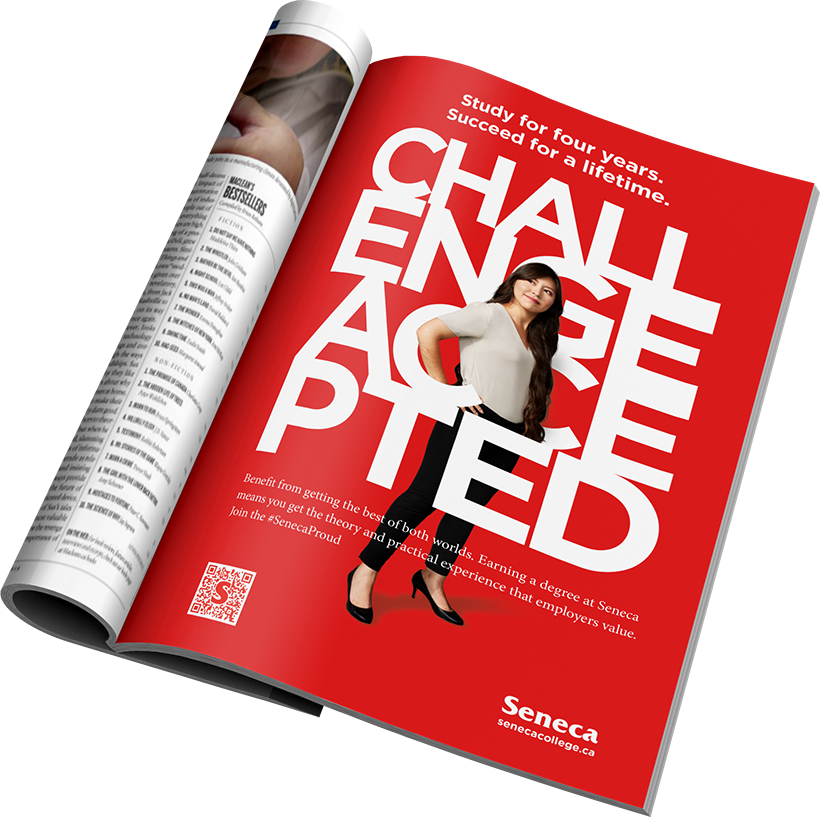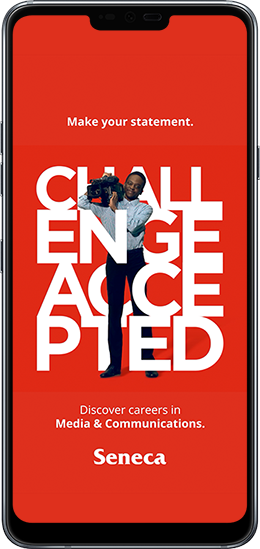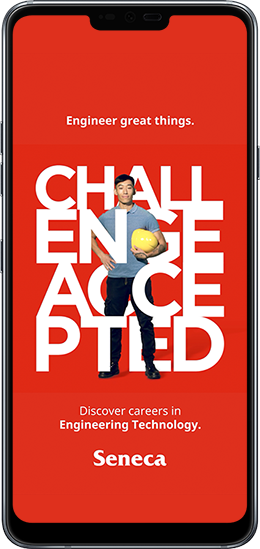Highlights
- Domestic enrolment at Seneca had fallen by more than 10% over five years, due in large part to a pervasive stigma against colleges.
- We found that the reason many people didn’t value college is because they think it’s too easy.
- Our “Challenge Accepted” campaign instead presented Seneca as a challenging path to a rewarding future.
- While COVID crushed enrolment at other GTA colleges and universities, Seneca’s confirmations rose 6.5% after years of declines.
- The campaign won several awards including Effies in 2021 and 2022.
Case study
Background
Seneca is a public college in Toronto, Ontario, with approximately 30,000 full-time students. It offers diplomas, certificates, and degrees in a wide range of subjects, including business, the arts, engineering, sciences, and health.
Challenge
Prospects and society at large increasingly see college as “less than” university — less prestigious, less lucrative, less rigorous, less challenging. For this reason, college is often seen as a plan B. Fewer than half of Grade 12 students feel college programs provide a credential that is valued by society.
These misperceptions were a big reason why, from a peak in 2013-14, domestic enrolment at Ontario colleges had fallen 4% by 2018-19. In the highly competitive GTA, Seneca’s domestic enrolment declined even further — more than 10%.
Yet notwithstanding these social pressures, Seneca really is the better choice for many students; the pathway to more rewarding careers and happier lives.
For their sake, and Seneca’s, we needed to help Seneca rise above the college stigma.
Key insight
The reason many people don’t value college is because they think it’s too easy.
Idea
Lift Seneca above the college stigma by emphasizing the challenge of earning a Seneca credential.
Plan
Many colleges advertise themselves as an easy pathway to a job. Seneca needed to present itself as a challenging but rewarding pathway to a thriving future.

Our campaign captured the Seneca spirit in two words: “CHALLENGE ACCEPTED.” The phrase, shown in bold letters on an audacious red background, became the core of an integrated recruitment campaign that touched every part of a prospective applicant’s journey.
We needed to achieve mass reach for two reasons. First, many people influence a prospect’s decision to apply, including parents, employers, and peers. Second, more than half of Seneca’s applicants left high school more than a year ago. These prospects may not yet be in the market for postsecondary education, even though it could help them upgrade or change their careers.
Our television spot brought an energy seldom seen in postsecondary advertising. It featured a voiceover from a speech by Seneca’s founding president, William Newnham, that is as true today as it was 50 years ago. Every shot in the spot represents either a Seneca student or graduate or work done by Seneca students.

The out-of-home and transit campaign spoke to influencers and prospects with high-impact locations such as Yonge-Dundas Square and strategic placement near other educational institutions. After the pandemic hit, we took advantage of lower media costs to increase Seneca’s presence still further, reaching the many prospects who are essential workers.



The digital campaign included tactical messaging on topics such as Virtual Open House and January or May start dates. It also matched a prospect’s interests to Seneca’s areas of study through display and social advertising.
Finally, “Challenge Accepted” also affected the most critical phase of recruitment: confirmation, when applicants decide whether or not to accept their offers. We urged applicants to confirm with a welcome package and sequenced e-mail campaign and we encouraged them to share the great news with a custom Snapchat filter.
Results
The bulk of Seneca’s offers for Fall 2020 had only just gone out when Ontario went into lockdown in March. With so much uncertainty, would applicants still confirm?
It turned out the pandemic gave “Challenge Accepted” a resonance none of us could have expected.
Confirmations
Domestic full-time, Fall 2020 vs. Fall 2019
By the start of the academic year, confirmations at GTA colleges had fallen 3% on average, and even GTA universities had fallen an average of 2.3% compared to 2019. But Seneca’s confirmations had risen 6.5%.
First-choice applications
Domestic full-time, Fall 2020 vs. Fall 2019
Seneca was the only GTA college to see an increase.
The number of first-choice applications rose 2.5% for Seneca, compared to an average of a 3.4% decline at other GTA colleges. Seneca was the only GTA college to see a rise in first-choice applications.
Likelihood to recommend
Net promoter score
percentage point increase in net promoter score among those who saw the campaign.
Seneca’s net promoter score rose an extraordinary 49 points among those who saw the campaign.
Our brand tracking also found people exposed to the campaign were much more likely to say that Seneca prepares graduates for the challenges of tomorrow, that Seneca is on the cutting edge of technology, and that Seneca provides a rigorous education.
Eighty percent of likely post-secondary applications who saw the campaign said they would be proud to graduate from Seneca, compared to 55% of those who didn’t see the campaign.
It will take years to completely overcome the college stigma, but this was a tremendous start. And if there’s anything we know about Seneca, it’s this: Senecans love a challenge.
Credits
- Client
- Seneca
- Agency
- Forsman & Bodenfors, Toronto
- Mass media
- twenty6two International
- Digital media
- Major Tom, Toronto
- Executive Director, Marketing (Seneca)
- Maria Wallin
- Manager, Marketing (Seneca)
- Lindsay Collins
- Chief Creative Officer (Forsman)
- Matt Hassell
- Executive Creative Director (Forsman)
- Laura Kim
- Copywriter (Forsman)
- Claudia Kloc
- Art Director (Forsman)
- Ardit Hasimi
- Strategy Director (Forsman)
- Cameron Fleming
- VP, Account Service (Forsman)
- Lorri MacDonald
- Account Directors (Forsman)
- Tyler Kawa and David Lineros
- Account Executive (Forsman)
- Nikita Chandiramani